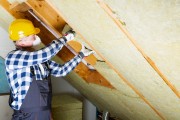On Thursday the Government of Alberta introduced legislation to establish a program that will make it easier for Albertans to invest in their homes: Property-Assessed Clean Energy (PACE) enables individuals to access funding from investors for energy efficiency and renewable energy projects. The cost is then repaid as an assessment on the property’s regular tax bill instead of being tied to an individual, which generates secure returns for investors. It addresses two barriers hindering energy efficiency and renewables investment from home and building owners: lack of upfront capital and lack of transferability of the investment.
Obviously, being an environmentalist, I get excited about the outlook of Albertans being able to more easily invest in clean energy improvements. But let’s be realistic — I’m an outlier. The reason why people do these investments and why this kind of programs have been successful in states like Texas, Utah, Missouri and Kentucky is not because people decided to reduce their individual greenhouse gas (GHG) emissions. The motivation of people and businesses to participate in these voluntary programs is that they can improve and invest in their homes and buildings, with savings from upgrades often exceeding the loan payback from day one, without having to come up with the high upfront costs and without having to worry about the amortization time of their investment.
We know that Alberta is an energy resource rich province. What is less known is that efficiency is one of the most under-utilized energy resources. Key to taking advantage of this resource is through enabling innovative financing mechanisms that can be used to leverage private capital and lower upfront costs for energy efficiency measures — and by giving people the choice on how they want to invest in this resource.
Albertans were given a few options: like participating in a direct install program. This popular program from Energy Efficiency Alberta (EEA) had triple the subscribers than anticipated, with 150,000 Albertans signing up. This clearly shows that people have an appetite to improve their home’s lighting, and save energy through high-efficiency showerheads, smart power bars and smart thermostats. There are also a variety of rebate programs, generating savings for Albertans directly in-store when they buy energy efficiency products including LED light bulbs, motion sensors, high-efficiency showerheads. There are also online rebates for furnaces, refrigerators, washing machines and smart thermostats or home improvement rebates for insulation, windows and tankless hot water heaters. The recent PACE announcement also opens the door to another option, for investment in higher capital-intensive projects in energy efficiency or renewables by providing support to install new windows or solar PV systems. All of these investments result in Albertans being more comfortable in their homes, increases the property value, and makes them less vulnerable to increases in utility bills.
So, going back to Thursday’s PACE announcement: apart from taking advantage of our most ignored resource, energy efficiency, with this program Albertans make their homes more comfortable and resilient. Each household that chooses to participate in PACE will help build and strengthen this emerging energy efficiency and distributed renewable industry that with a high local labour component contributes to the diversification of the province’s economy. The intention is for PACE programs to start next January. As users of the program, we should expect it to be easy to apply for and implement, and we should hold government accountable to ensure this. As an environmentalist, I’m happy to see programs happening that not only make sense from a GHG emissions reduction perspective, but by giving Albertans more tools to invest in their homes while strengthening another sector of Alberta’s economy.








